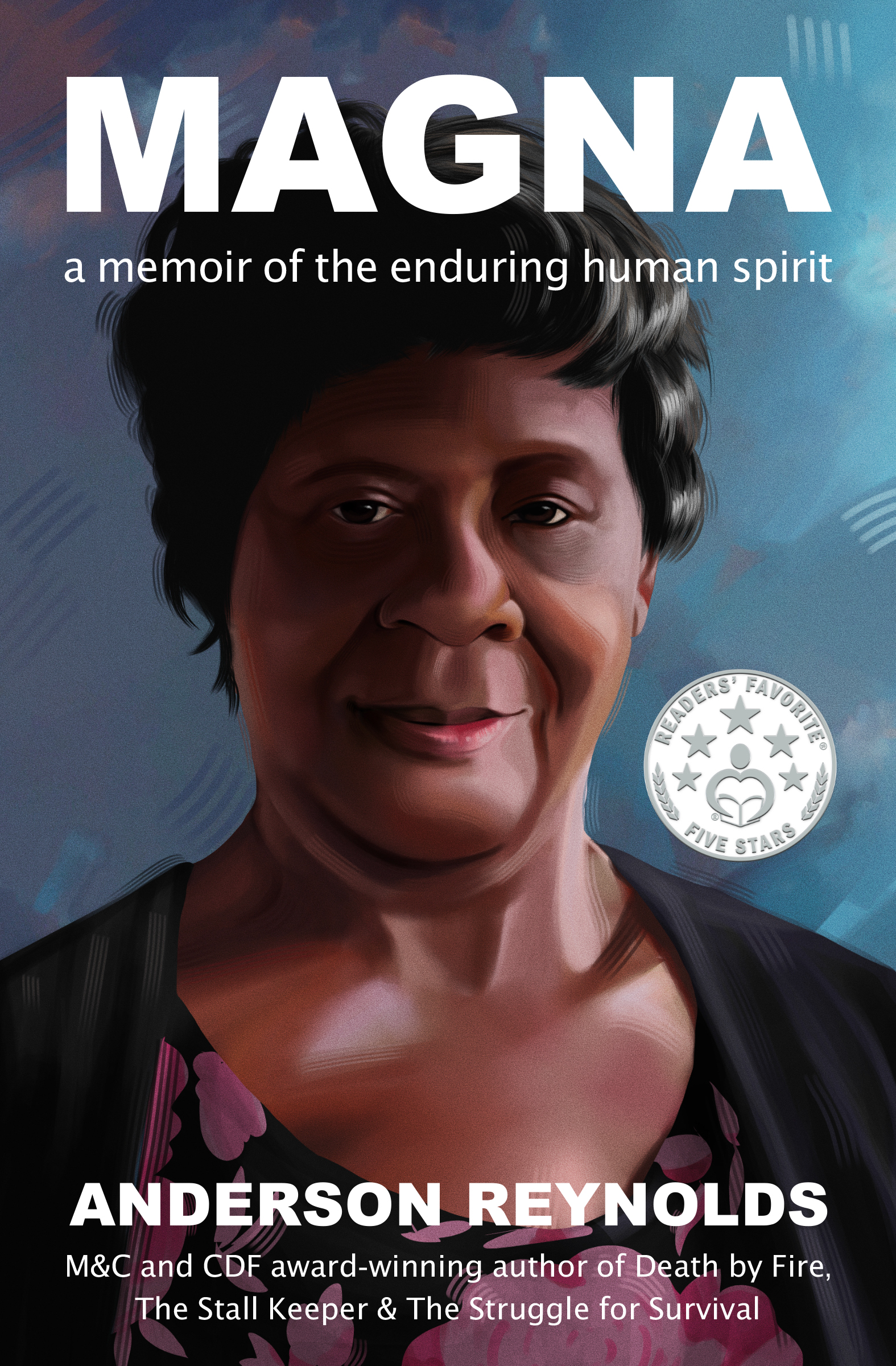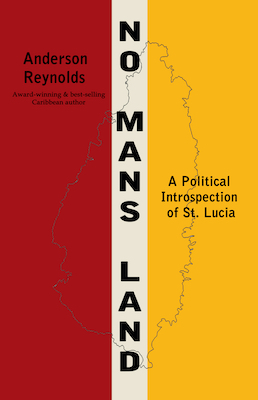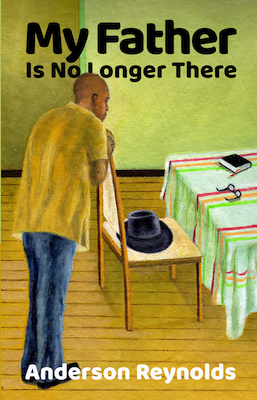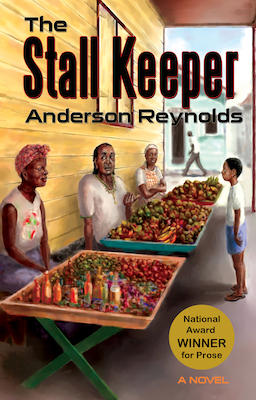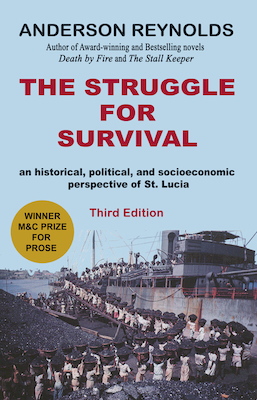“…exceptionally lucid, unrelenting in its candor…extravagant in detail, unbridled in its laudatory acknowledgement of the mother figure…Reynolds’ finest..”
—Modeste Downes, author of Phases, Theatre of the Mind, and A lesson on Wings

Forthcoming May 2025
Through the example of his mother’s life, one of St. Lucia’s best storytellers and foremost public intellectuals brings us a rich and compelling narrative, suffused with the history and culture of his country, that presents invaluable lessons about dying, about how best to raise children, and how best to live a meaningful and impactful life right thru old age. It is a tour de force, an unflinching interrogation of history, the society that gave rise to the author, parent-child bonding and separation, family values, intergenerational trauma, mortality, religion and spirituality, and the nature of love and sacrifice.
The story is told of Philomene (1929-2020), the fourth of thirteen children of Marie and Jonah Francis, growing up under austere circumstances in rural St. Lucia during the Great Depression era. In her late teens, she forsakes the mainstream Roman Catholic Church into which she was born for the fringe Seventh-Day Adventist denomination. Her subsequent marriage to St. Brice Reynolds, a tailor by trade, takes her to the town of Vieux Fort in the late 1940s as the Americans were in the process of decommissioning their World War II Vieux Fort military base.
In Vieux Fort, she and her husband wage a bread-and-butter struggle to keep their family of nine children afloat while wrestling to keep them on the straight and narrow path in a town they deemed a den of iniquity.
In the late 1950s, Philomene left her children in the care of her father and younger sisters to join her husband in London, thus becoming part of the great post-war West Indian migration, which would go down in history as the “Windrush Generation.” Philomene and her husband’s stint in England lasted only a few years and was part of an effort to better provide for their children, but the separation would have dire and possibly lasting consequences for the children left behind.
Praise for Magna
“A heartfelt reflection on personal and shared history…A tender memoir of identity, society, and determination…a loving yet bittersweet contemplation…imparts timeless lessons on resilience and meaning.” —Booklife (Editor’s Pick)
“The writing is exceptionally lucid and unrelenting in its candor…extravagant in detail, unbridled in its laudatory acknowledgement of the mother figure; this book is Reynolds’ finest…it reads as smoothly and as entertainingly as any Hemingway, Dylan Thomas, or Toni Morrison work.”
—Modeste Downes, author of A Lesson on Wings
“A wonderful book… a rich reading experience… This will be an important book for many people, in how it goes deep into the workings of a family, and how it holds up for both inquiry and honoring, this quite astonishing woman; and in how it brings forward the intricate connections of the historical, cultural, emotional, economic context with the lives of individuals and families. The real nature of this book is that it thrives in its wonderful writing, honesty, rich context, and guided investigation by the narrator of how his world works.”
—Anya Achtenberg, author of Blue Earth
“Anderson Reynolds tells the life story of a St. Lucian woman, his mother, whose motherly love, as well as her capacity to extend this overwhelming concern to her larger family and community, seems almost larger than life…it’s a tale of the best in the human spirit…”
—Allan Weekes, author of Talk of the Devil
The juxtaposition of the author’s personal experience of his mom, his mother’s researched life story (and that of her relatives), and St. Lucia’s contemporary history makes this a well-written, very interesting, very readable, very multi-faceted book. Narrated social history at its best.
—Dr. Jolien Harmsen, author of A History of St. Lucia
Reviews of Magna
—Booklife (Editor’s Pick)
This intricate blend of history, socioeconomics, and memoir follows the life of Reynolds’s mother, Philomene, who grew up on St. Lucia during the Great Depression. Through her eyes, Reynolds explores the rich history and culture of St. Lucia, foraging insights into life, death, and the challenges of raising children along the way. Reynolds delves into his upbringing and the societal forces that shaped him as well, touching on themes of mortality, sacrifice, and purpose, as he charts his mother’s transformation, in her later years, from a “proactive, industrious woman” to one “totally dependent on others.”
A heartfelt reflection on personal and shared history, Magna imparts timeless lessons on resilience and meaning. Reynolds (They Called Him Brother George) honors his mother with a realistic but touching presentation of both her shortcomings and accomplishments, recognizing, in spite of the lasting impact of his abandonment trauma—an aftereffect of his mother moving to England to join his father, leaving him, and his siblings, behind during early childhood—the values she imparted to him: discipline, hard work, inner resolve. “To be in my mother’s world was to be in a beehive of activity. It was no place for the lazy,” he observes.
The rich context Reynolds provides—historical, social, and emotional—offers a fuller picture of his entire family’s journey, unfolding in a loving yet bittersweet contemplation of the culture and times they lived in. From hand-squeezing honeycomb to marking St. Lucia’s path to independence to his parents’ Adventism, Reynolds paints his history in tones of strength and kindness, as an example to learn from. He closes with a reproduction of his mother’s eulogy, filtering her lifelong passion for gardening against the legacy she left her children: “Mama planted many, many seeds during the course of her life,” he writes, “Most of all she planted seeds that produced discipline, industriousness, compassion, and self-belief in her children.”
Takeaway: Tender memoir of identity, society, and determination.
Comparable Titles: Jason Allen-Paisant’s The Possibility of Tenderness, Viet Thanh Nguyen’s A Man of Two Faces.
Pikasho Deka, Readers’ Favorite (starred review)
Magna tells the life story of Philomene “Magna” Francis, an extraordinary woman who overcame severe poverty and adversity to become the matriarch of her family, becoming a symbol of hope for her descendants and extended family. In this captivating biography, Anderson Reynolds gives a comprehensive account of his mother’s life, beginning with her childhood in Desruisseaux, St. Lucia, during the Great Depression, growing up as the fourth child among thirteen. Her parents were descended from the Igbo people in Nigeria. Magna ingrained the habit of hard work and discipline into the youngsters in her family. After spending two years in London, she returned to St. Lucia to look after her children. As a devoted Seventh-Day Adventist, Magna detested gambling and other vices and strove to live a healthy and productive life even in old age.
Magna is an inspiring story of a strong woman who battled significant odds to ensure her children and family were prepared to tackle the rigors of life. Anderson Reynolds pays homage to his mother’s life with this beautifully written account that has you hooked from the first page to the last. The author never shies away from showing the darker aspects of life as parts of the book touch upon vital social issues such as racism, slavery, discrimination, poverty, privilege, and more. But at its core, this book is about a woman with a vibrant spirit and a larger-than-life presence among her people. Reynolds paints a colorful tapestry of his mother’s life, focusing on the momentous events that shaped Magna into who she was. If you enjoy true inspirational stories, you’ll love this book!
K.C. Finn, Readers’ Favorite (starred review)
Magna: A Memoir of the Enduring Human Spirit by Anderson Reynolds tells the true story of Philomene ‘Magna’ Francis, a strong and determined woman who faced many hardships while growing up in rural St. Lucia during the Great Depression. Reynolds takes readers through her life, showing how she never gave up, no matter how tough things got. He focuses on important themes like family, love, and the sacrifices people make to give their children a better future. The book isn’t just about Magna’s life—it also gives a deep look into St. Lucia’s history and culture at the time. Reynolds does a great job of making both her personal struggles and the bigger world around her feel real and important, helping readers connect to the story on many levels.
Anderson Reynolds knows how to tell a story in a way that really sticks with you. One of the things I loved most about this book was how he talked about family and how our early experiences shape us. His writing is beautiful but still easy to understand, making even big ideas feel natural and relatable. The way he brings family relationships to life makes you think about your own connections to heritage and identity. He also does an amazing job of weaving personal stories with the history of St. Lucia, making everything feel more meaningful. At the same time, he’s honest about both the good and bad times, which makes the book even more powerful. Overall, Magna: A Memoir of the Enduring Human Spirit is a fantastic read for anyone who loves stories about family, culture, and the incredible strength people have in the face of hardship.
Grant Leishman, Readers’ Favorite (starred review)
Magna: A Memoir of the Enduring Human Spirit by Anderson Reynolds is a frank, no-nonsense biography of the author’s mother’s life on the island of St. Lucia in the Caribbean. Philomene “Magna” Francis was the fourth of thirteen children growing up in a rural area of St. Lucia during the Great Depression. Times were exceptionally difficult and it was this austerity and resilience that would shape the character of Magna Francis. She would rise to become the matriarch of a massive extended family, many of whom would move from St. Lucia as times and circumstances dictated but they would always be bound to their island home by their mother’s strength and purposfulness of character. As Magna lay bedridden and unable to move for the last few years of her life, tended to by her loving daughter and her son, the author, everyone had the opportunity to reflect on the life of this remarkable, resilient, and yet larger-than-life figure who was deeply respected throughout the wider St. Lucia community.
Magna is much more than just a familial history story; it is a document that offers thoughts on parenthood, family relationships, love, and the nature of inter-generational disappointment and regret. What I particularly appreciated was that Anderson Reynolds didn’t paint his mother as some sort of saint, a notion that many in the community may well have attributed to her. The author’s intense sadness and bitterness at their mother’s separation from the family, when he was just a toddler, shines through the narrative and plays a large part in his ability to come to terms with his disappointment. The writing flows effortlessly as the author traces his mother’s indomitable spirit and her unwillingness to accept anything less than what she demanded for her family. The story of how she ensured her children’s education, in an area ill-served by educational resources, is a testament to her unwillingness to accept the status quo but to push for what she believed her children truly deserved. This book is a wonderful social history that chronicles the indomitability of one woman’s spirit but, through anecdotal accounts, also shows her humanity and fallibility. Whilst this will be an invaluable read for all the Reynolds diaspora wherever they may now be, it is also a wonderful story of a hard life, well lived, in a tropical paradise. I highly recommend this read.
Modeste Downes, author of A Lesson on Wings
Set in the Caribbean Island of Saint Lucia, with glimpses of a past when its inhabitants lived a life of near-biblical proportions—by the sweat of thy brow thou shalt eat bread—and when the luxuries and comforts of a sophisticated civilization had not yet quite arrived, this one is definitely a page-turner.
The majesty of Anderson Reynolds’ literary craftsmanship is evident in this heart-wrenching memoir of a beloved mother and matriarch as she lay on her deathbed, marking a dramatic turn in her hitherto extraordinarily active life. A multi-layered construct, it recounts the story of a close-knit family, with all the details bared, not dissimilar to a finished work of Picasso, or a Dunstan St. Omer (Saint Lucia’s foremost painter).
The author as narrator introduces a family of modest beginnings, originating in rural, post-colonial Saint Lucia, capturing for the reader every stage of its journey and growth, its struggles and occupational hazards, its internal rivalries and shenanigans, as well as its moments of joy, successes and triumphs. It portrays a husband and wife who knew no limits to the sacrifices they would make to ensure the best for the growing family. It tells of a mother, especially, who would even jettison her avowed religious principles to secure a better life for her loved ones. Its main focus, however, and the thread that holds its several strands together, is the situation that concerns a seemingly dying mother who will not go quietly but is intent on “rage against the dying of the light.” Though bedridden, she poses untold challenges to all and sundry, even in her condition of total dependency on others, her medical care routine shifting variously between home and hospital.
As he navigates between a dying mother and confronting the reality of a future without her, the writer seizes the opportunity to expose the state of culture, religion, politics and social conditions of the day. In this way, he constructs a canvas that mirrors the environment that brought forth and shaped the family and that outstanding figure of a woman. And he does all that in a writing style that is exceptionally lucid and incredibly unrelenting in its candor. There are moments in the narrative where Reynolds might appear to be somewhat extravagant in detail, but that is because he wants the reader to grasp the frame in its completeness.
What is also patently clear is that the writing is unbridled in its laudatory acknowledgement of the mother figure. The caregiver daughter, the writer’s eldest sister, is equally duly acknowledged for her unflinching commitment and devotion to the bedridden parent.
Significantly, it turns out that this is also a story about the narrator/author himself, that traces his life from infancy through adulthood—a life in which the process of bonding between mother and child, while he is yet a toddler, is so badly damaged, and the child so psychologically and emotionally bruised, that it takes nothing less than her ailing final moments and death for him to arrive at a self-proclaimed reconciliation.
In its closing chapters, the author shares his thoughts on several life lessons that will serve anyone who reads the book in good stead. They provide the reader a close-up of the writer’s state of mind, the depth of his ratiocination on certain issues, and clear insights into his personality, in a manner hardly encountered in most similar publications.
This book is destined to be one of Reynolds’ finest. Though generous in its measure of tangential details, it reads nearly as smoothly, and as entertainingly, as any Hemingway, Dylan Thomas or Toni Morrison.
Author’s Note
Magna: A Memoir of the Enduring Human Spirit is my second memoir and seventh book. It is the second installment of a planned memoir trilogy, where the first installment, My Father Is No Longer There, focused on my father. The third and final installment will focus on my life with emphasis on my school days. Please look out for My Mother in May 2025, when it will be published and officially launched.
I would like to thank you for reading my books and blogs and for following me on social media. I hope you found my books worthwhile reads. I’m very much interested in what you thought of them, and I’m sure other readers would, too, so it would mean a lot to me for you to leave a review on Amazon, Goodreads, or other online platforms.
